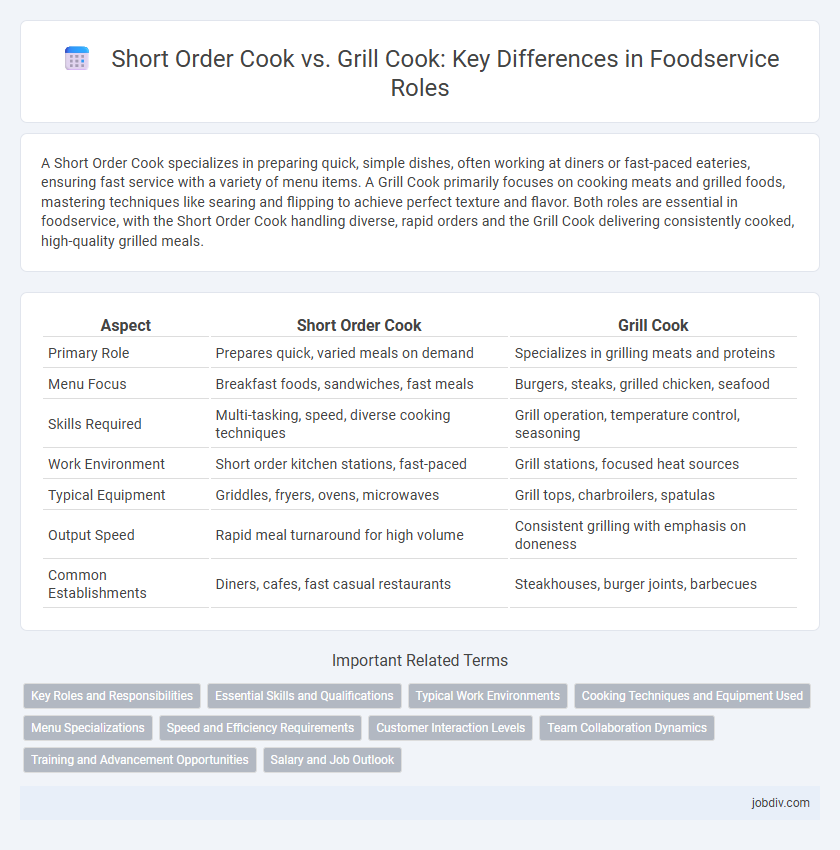A Short Order Cook specializes in preparing quick, simple dishes, often working at diners or fast-paced eateries, ensuring fast service with a variety of menu items. A Grill Cook primarily focuses on cooking meats and grilled foods, mastering techniques like searing and flipping to achieve perfect texture and flavor. Both roles are essential in foodservice, with the Short Order Cook handling diverse, rapid orders and the Grill Cook delivering consistently cooked, high-quality grilled meals.
Table of Comparison
| Aspect | Short Order Cook | Grill Cook |
|---|---|---|
| Primary Role | Prepares quick, varied meals on demand | Specializes in grilling meats and proteins |
| Menu Focus | Breakfast foods, sandwiches, fast meals | Burgers, steaks, grilled chicken, seafood |
| Skills Required | Multi-tasking, speed, diverse cooking techniques | Grill operation, temperature control, seasoning |
| Work Environment | Short order kitchen stations, fast-paced | Grill stations, focused heat sources |
| Typical Equipment | Griddles, fryers, ovens, microwaves | Grill tops, charbroilers, spatulas |
| Output Speed | Rapid meal turnaround for high volume | Consistent grilling with emphasis on doneness |
| Common Establishments | Diners, cafes, fast casual restaurants | Steakhouses, burger joints, barbecues |
Key Roles and Responsibilities
Short order cooks specialize in preparing quick meals such as sandwiches, eggs, and pancakes, managing multiple orders simultaneously to maintain fast service. Grill cooks are responsible for grilling meats, seafood, and vegetables, ensuring precise temperature control and consistent product quality. Both roles require strong organizational skills, but short order cooks prioritize speed and versatility, while grill cooks focus on cooking techniques and food safety standards.
Essential Skills and Qualifications
Short order cooks require fast multitasking abilities, proficiency in preparing a variety of quick meals, and strong time management skills to handle high-volume orders efficiently. Grill cooks need expertise in temperature control, meat preparation techniques, and knowledge of food safety standards to ensure consistent quality and flavor. Both roles demand stamina, attention to detail, and effective communication to maintain smooth kitchen operations in fast-paced foodservice environments.
Typical Work Environments
Short order cooks typically work in fast-paced diners, cafes, and casual restaurants where quick preparation of simple dishes is essential. Grill cooks often operate in steakhouses, burger joints, and large-scale kitchens focusing on grilling meats and seafood over open flames or flat tops. Both roles require standing for extended periods and working in high-temperature, noisy environments.
Cooking Techniques and Equipment Used
Short order cooks excel at preparing quick, simple dishes using equipment like griddles, fryers, and microwaves to meet high-volume demand efficiently. Grill cooks specialize in cooking meats and other items over open flames or charbroilers, employing techniques such as direct grilling and searing to enhance flavor and texture. Both roles require mastery of specific equipment and precise timing to deliver consistent, high-quality meals in fast-paced foodservice environments.
Menu Specializations
Short order cooks specialize in preparing quick, simple dishes such as eggs, sandwiches, and breakfast items, emphasizing speed and efficiency for fast-paced foodservice environments. Grill cooks focus on cooking meat and seafood on grills or griddles, mastering items like burgers, steaks, and grilled vegetables, often for menus centered on flame-cooked or charbroiled specialties. Both roles require expertise in specific cooking techniques aligned with their core menu items to maintain consistency and quality in foodservice operations.
Speed and Efficiency Requirements
Short order cooks excel in rapid preparation of a wide variety of simple dishes, emphasizing speed to meet quick turnover demands in diners and fast-casual settings. Grill cooks focus on efficiently handling high-volume grilling tasks, requiring precision timing and consistent heat management to ensure product quality and fast service. Both roles demand sharp multitasking abilities, but short order cooks prioritize versatility while grill cooks emphasize specialized speed on the grill station.
Customer Interaction Levels
Short order cooks engage frequently with customers, swiftly preparing customized meals based on immediate orders and special requests, enhancing guest satisfaction through personalized service. Grill cooks primarily focus on cooking tasks with minimal direct customer interaction, maintaining efficiency and consistency in meal preparation behind the scenes. Both roles are vital in foodservice operations but differ significantly in their levels of customer engagement and communication.
Team Collaboration Dynamics
Short order cooks and grill cooks play complementary roles in foodservice kitchens, where efficient team collaboration dynamics drive timely meal preparation. Short order cooks specialize in preparing quickly assembled dishes, requiring constant communication with grill cooks who handle protein grilling and often manage multiple items simultaneously. Effective coordination and clear task delegation between these roles minimize bottlenecks and enhance overall kitchen productivity.
Training and Advancement Opportunities
Short order cooks typically require basic culinary training focused on quick meal preparation, making it easier to enter the foodservice industry and advance to supervisory roles in fast-paced environments. Grill cooks often benefit from more specialized training in grilling techniques and temperature control, which can lead to advancement as kitchen specialists or line cooks in upscale dining establishments. Both positions offer pathways to chef roles, but grill cooks may have greater opportunities for skill development through mentorship and advanced culinary programs.
Salary and Job Outlook
Short order cooks typically earn an average hourly wage of $12 to $15, while grill cooks average slightly higher, around $13 to $17 per hour due to specialized skills. The job outlook for both roles is steady, with a projected growth rate of 4% over the next decade, driven by sustained demand in fast-paced foodservice environments. Grill cooks may have better advancement opportunities in restaurants focusing on grilled or specialty cuisines, impacting long-term salary potential.
Short Order Cook vs Grill Cook Infographic

 jobdiv.com
jobdiv.com